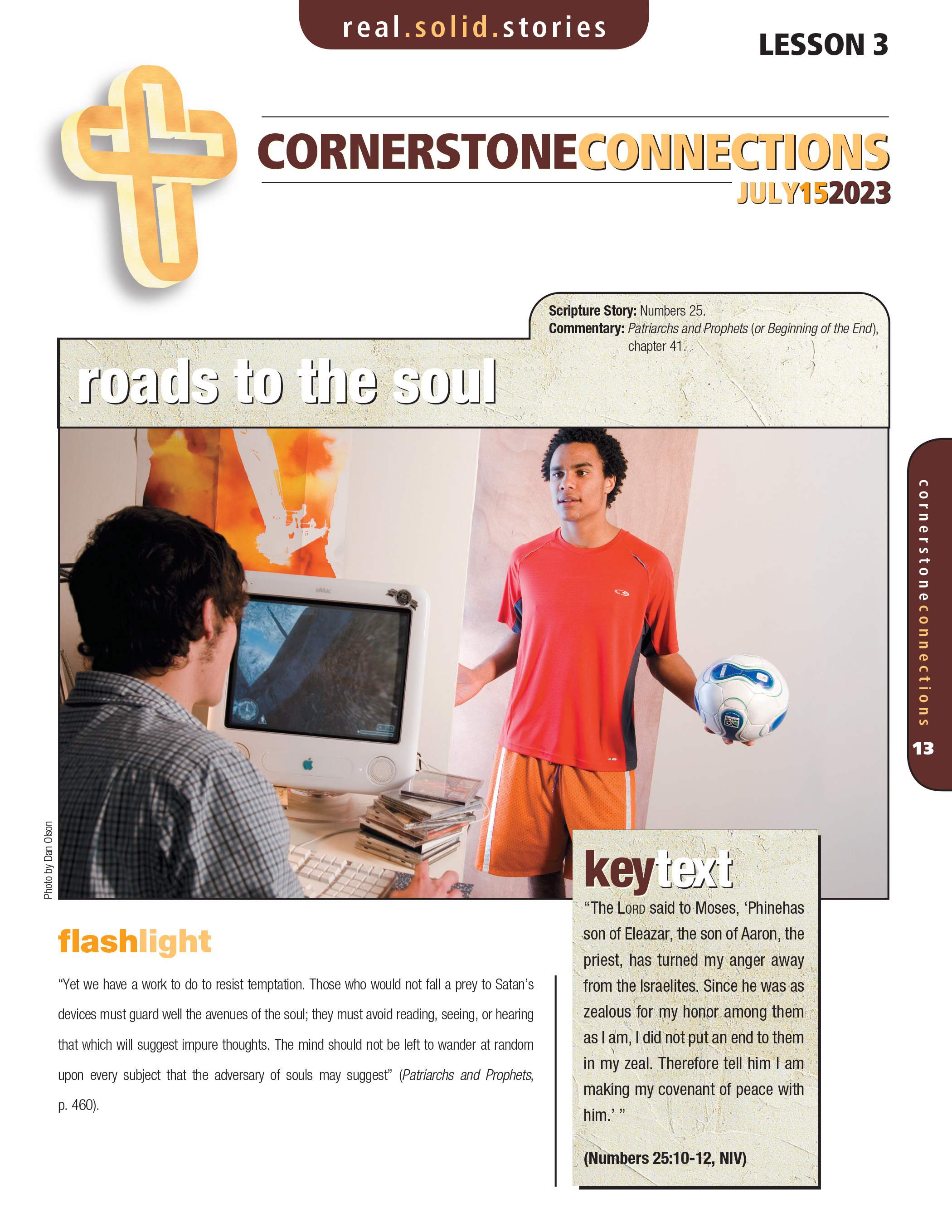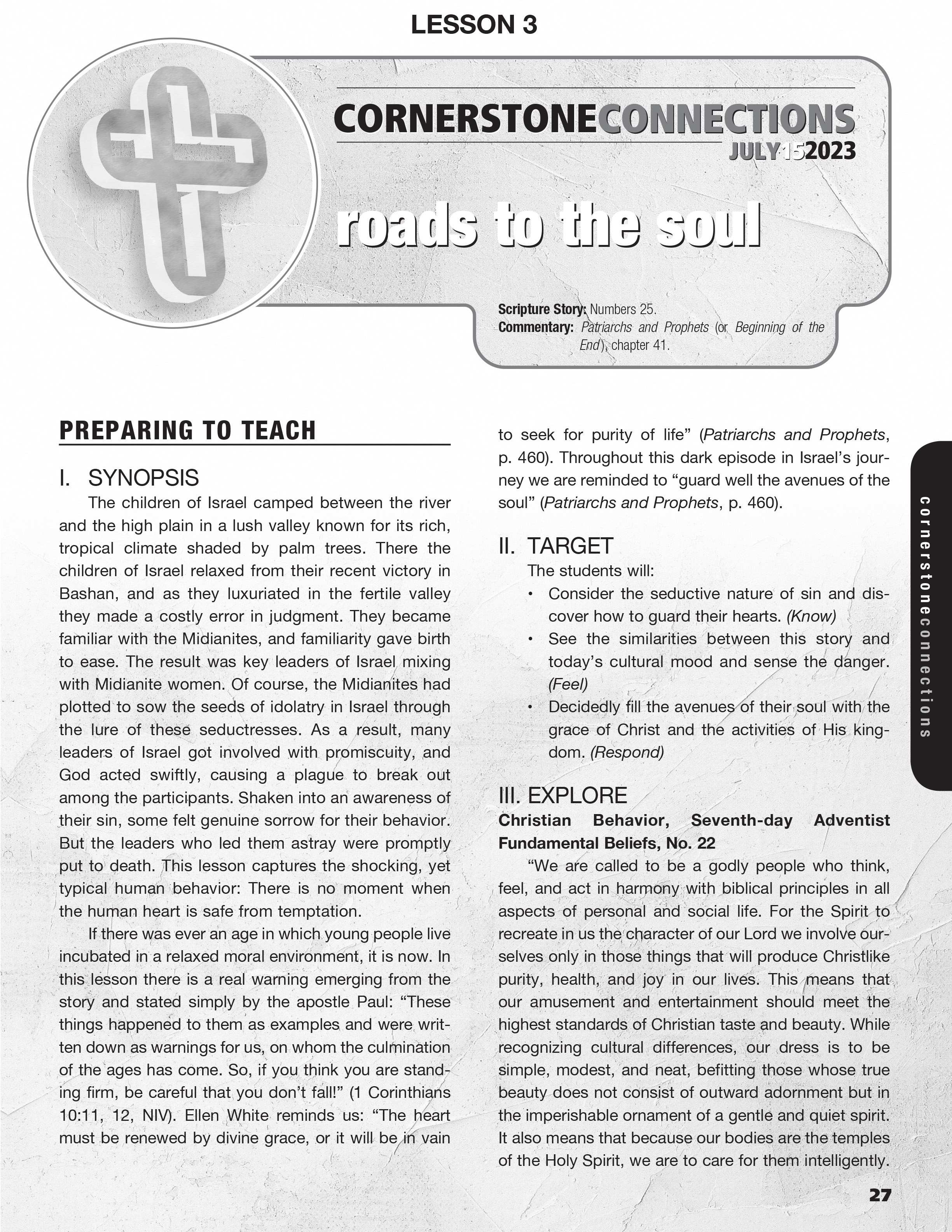"Roads to the Soul"
Click below to download the Cornerstone Connections leader’s guide and student lesson. This week’s resources also include two lesson plans and a discussion starter video which offer different ways of looking at the topic. Each lesson plan includes opening activities, scripture passages, discussion questions, and real-life applications.
The Israelites learn, once again the hard way, that there is no moment when the human heart is safe from temptation.
Beginning of the End
(Patriarchs and Prophets), ch. 41
How Balaam Led Israel Into Sin

SCRIPTURE PASSAGES
OVERVIEW
The Bible is full of difficult stories—today’s lesson is no exception. Why do you think God includes stories like the one in Numbers 25? As we explore the lesson today, we will be looking at the principles taught and what we can learn and apply to our lives today. This and other stories weren’t put in the Bible as extraneous information, but to help us investigate the lives of God’s people in the past to see how they treated God and how God felt about how they lived. Again, this is a difficult story, but let’s see what life lessons, we can gain from it.

OPENING ACTIVITY: NOTICING THE DETAILS
The reason for this activity is to remind your students to pay attention to what is going on around them—the sights, smells, and textures. It is too easy to be stuck in one’s electronics and not see the amazing things God has created for us.
TRANSITION
Life is often in the details. If one doesn’t look at the fine print, one might get stuck paying more interest on a loan, or not getting paid as much for one’s hard work as expected or having to stay in a lease longer than desired. The Bible is no exception. God shared through His prophets the best way to live and at times not only gave suggestions on how to live, but commanded how He wanted His people to live and shared the consequences on what would happen if they didn’t follow His instructions. Let’s see what we can learn from Numbers 25.
BIBLE STUDY GUIDE
What is the history of the Moabites?
Read Genesis 19:30-38.
30 Lot and his two daughters left Zoar and settled in the mountains, for he was afraid to stay in Zoar. He and his two daughters lived in a cave. 31 One day the older daughter said to the younger, “Our father is old, and there is no man around here to give us children—as is the custom all over the earth. 32 Let’s get our father to drink wine and then sleep with him and preserve our family line through our father.”
33 That night they got their father to drink wine, and the older daughter went in and slept with him. He was not aware of it when she lay down or when she got up.
34 The next day the older daughter said to the younger, “Last night I slept with my father. Let’s get him to drink wine again tonight, and you go in and sleep with him so we can preserve our family line through our father.” 35 So they got their father to drink wine that night also, and the younger daughter went in and slept with him. Again he was not aware of it when she lay down or when she got up.
36 So both of Lot’s daughters became pregnant by their father. 37 The older daughter had a son, and she named him Moab; he is the father of the Moabites of today. 38 The younger daughter also had a son, and she named him Ben-Ammi; he is the father of the Ammonites of today.
DISCUSSION
According to Jewish tradition and early church fathers, Lot’s daughters believed the whole world had been destroyed and that this was the only way for humanity to continue. (https://en.wikipedia.org/wiki/Lot%27s_daughters#CITEREFKadari2015)
This is the beginning of the Moabite nation.
“The Moabites were a pagan nation, which means they did not worship or serve YHWH. Idolatry was one of the innate characteristics of all the nations surrounding Israel, and Chemosh was the national god of the Moabites (Numbers 21:29). But like all other pagan nations, the Moabites were polytheistic (Judges 10:6), and through much of their history, they were hostile toward Israel. Their proximity proved a continuous threat to the eastern borders of Israel, and the pagan religious practices they followed tempted the Israelites to commit idolatry. Also, the Moabites’ lust for power and conquest threatened Israel’s possession of the Promised Land.”
Read Numbers 25:1-18.
While Israel was staying in Shittim, the men began to indulge in sexual immorality with Moabite women, 2 who invited them to the sacrifices to their gods. The people ate the sacrificial meal and bowed down before these gods. 3 So Israel yoked themselves to the Baal of Peor. And the Lord’s anger burned against them.
4 The Lord said to Moses, “Take all the leaders of these people, kill them and expose them in broad daylight before the Lord, so that the Lord’s fierce anger may turn away from Israel.”
5 So Moses said to Israel’s judges, “Each of you must put to death those of your people who have yoked themselves to the Baal of Peor.”
6 Then an Israelite man brought into the camp a Midianite woman right before the eyes of Moses and the whole assembly of Israel while they were weeping at the entrance to the tent of meeting. 7 When Phinehas son of Eleazar, the son of Aaron, the priest, saw this, he left the assembly, took a spear in his hand 8 and followed the Israelite into the tent. He drove the spear into both of them, right through the Israelite man and into the woman’s stomach. Then the plague against the Israelites was stopped; 9 but those who died in the plague numbered 24,000.
10 The Lord said to Moses, 11 “Phinehas son of Eleazar, the son of Aaron, the priest, has turned my anger away from the Israelites. Since he was as zealous for my honor among them as I am, I did not put an end to them in my zeal. 12 Therefore tell him I am making my covenant of peace with him. 13 He and his descendants will have a covenant of a lasting priesthood, because he was zealous for the honor of his God and made atonement for the Israelites.”
14 The name of the Israelite who was killed with the Midianite woman was Zimri son of Salu, the leader of a Simeonite family. 15 And the name of the Midianite woman who was put to death was Kozbi daughter of Zur, a tribal chief of a Midianite family.
16 The Lord said to Moses, 17 “Treat the Midianites as enemies and kill them. 18 They treated you as enemies when they deceived you in the Peor incident involving their sister Kozbi, the daughter of a Midianite leader, the woman who was killed when the plague came as a result of that incident.”
DISCUSSION

APPLICATION
Here are a couple concepts gleaned from this passage:
1. It is easy to get distracted. Think about the last time you stayed up way later than you planned because you were on your device watching movies, checking out social media, etc. You probably didn’t mean to do it, but it happens. God knows His people get easily distracted and like a good parent God attempts to provide them guidelines that will help them keep their focus.
2. Faithfulness to God is always better than following your own way. Sometimes it seems like parents are attempting to keep their kids from having a good time when in reality they are using their years of experience to provide a better life experience. It’s true, there are portions of scripture that are challenging to understand, but the vast majority of the Bible is filled with easy to understand guidelines and stories that help us understand the character of God and provide signposts that help us navigate through life.
FOLLOW UP

SCRIPTURE PASSAGE
LEADER’S NOTE
For a Relational Bible Study (RBS) you’ll want to get into the Scripture passage and encourage the youth to imagine participating in the story while it’s happening. Then you will be able to better apply it to your own situation today.
You will need to ask God for the Holy Spirit to be present as your small group discusses the questions (no more than 3-6 people in a group is recommended). Start with the opening question. It is a personal question and the answer is unique for each individual. There is no right answer and nobody is an expert here, so don’t be surprised when you hear different responses. You are depending on the Holy Spirit to be present and to speak through your group. Say what God prompts you to say, and listen to what others share.
Take turns reading the chapter out loud. Follow that with giving the students some time to individually mark their responses to the questions (a PDF version of the handout is available as a download). This gives each person a starting point for responding when you start to share as a group. Next, begin the discussion by asking the students to share what they marked and why on each question as you work your way through. Feel free to take more time on some questions than others as discussion warrants.
Encourage each person in the group to apply what is discussed to their personal lives and to share with the group what they believe God wants them to do. Then ask them to pray that God will help each of them to follow through in doing so. Remind them to expect that God will show them ways to live out the message of this passage in the coming week, and that they are free to ask others in the group to help hold them accountable.
OVERVIEW
This is a Bible passage the leader will need to seriously consider before choosing to include it in a Youth Sabbath School discussion. Like several stories in the Bible, this one could be considered “X-rated” (not even “R-rated”). It includes sex, and lots of it. It involves brutal violence, and lots of it. From a religious standpoint, it includes idolatry. And it doesn’t have a happy ending. For any or all of these reasons, you may prefer to use a completely different lesson—maybe one from a year or two ago.
On the other hand, quite a few teens are exposed to these things—maybe without their parents’ knowledge. You may choose to purposely include this lesson because it deals with what many teens are aware of in the world, and this is from the Bible! But because of the sensitive topic, you may want to alert the parents of the teens to the topic in advance, pointing out that you’re covering this in Youth Sabbath School because it’s in the Bible and you’d like for the youth to look at these shocking realities from God’s perspective rather than from the world’s perspective.
What is the story? It follows God’s intervention in Balaam’s curse-for-profit-prophetic-ministry/job. Last week’s lesson covered the story of Balaam and the talking donkey—a favorite children’s story. But most children don’t continue with the follow-up story in Numbers 25—our passage for this Sabbath. And there’s a sequel/follow up to this story, but it’s not until Numbers 31—as the teacher you should read this passage in advance of the class.
The Midianites and Moabites were somewhat related to the Israelites, but they practiced paganism, including offering food sacrifices to Baal to make the land fertile, and then following up the food offering with sexual intercourse. Instead of priests, they used priestesses to complete their pagan worship with the men who came. That would be pretty shocking in your church, right?! For some background on these two groups, go to https://www.gotquestions.org/Midianites.html and https://www.gotquestions.org/Moabites.html.
As with each time you teach, you’ll want to be sure you’re connected to God as you lead the youth into a group discussion on this passage of Scripture—Numbers 25:1-18.
Why Did You Do That?
When have you done something another person thought was very bad?
Read Numbers 25:1-18.
While Israel was staying in Shittim, the men began to indulge in sexual immorality with Moabite women, 2 who invited them to the sacrifices to their gods. The people ate the sacrificial meal and bowed down before these gods. 3 So Israel yoked themselves to the Baal of Peor. And the Lord’s anger burned against them.
4 The Lord said to Moses, “Take all the leaders of these people, kill them and expose them in broad daylight before the Lord, so that the Lord’s fierce anger may turn away from Israel.”
5 So Moses said to Israel’s judges, “Each of you must put to death those of your people who have yoked themselves to the Baal of Peor.”
6 Then an Israelite man brought into the camp a Midianite woman right before the eyes of Moses and the whole assembly of Israel while they were weeping at the entrance to the tent of meeting. 7 When Phinehas son of Eleazar, the son of Aaron, the priest, saw this, he left the assembly, took a spear in his hand 8 and followed the Israelite into the tent. He drove the spear into both of them, right through the Israelite man and into the woman’s stomach. Then the plague against the Israelites was stopped; 9 but those who died in the plague numbered 24,000.
10 The Lord said to Moses, 11 “Phinehas son of Eleazar, the son of Aaron, the priest, has turned my anger away from the Israelites. Since he was as zealous for my honor among them as I am, I did not put an end to them in my zeal. 12 Therefore tell him I am making my covenant of peace with him. 13 He and his descendants will have a covenant of a lasting priesthood, because he was zealous for the honor of his God and made atonement for the Israelites.”
14 The name of the Israelite who was killed with the Midianite woman was Zimri son of Salu, the leader of a Simeonite family. 15 And the name of the Midianite woman who was put to death was Kozbi daughter of Zur, a tribal chief of a Midianite family.
16 The Lord said to Moses, 17 “Treat the Midianites as enemies and kill them. 18 They treated you as enemies when they deceived you in the Peor incident involving their sister Kozbi, the daughter of a Midianite leader, the woman who was killed when the plague came as a result of that incident.”
1. Why did the Israelite men sleep with the Moabite women?
2. What made this so offensive?
3. Why did the Israelite leaders get executed publicly (vss. 4-5)?
4. Why did Zimri bring Cozbi into his tent in front of the Israelites?
5. Why did Phinehas run his spear through Zimri and Cozbi?
6. Why did God destroy the Midianites/Moabites (vs 17)?
7. Why has sex been such a big deal for good and evil for thousands of years?
8. Why is this story in the Bible? What does it tell you?
SUMMARY
Seduction, sex, and assassination—all in one chapter of the Bible. While this might not be appropriate for children, you’re at an age when these are realities you must deal with. They were true in Bible times and they continue today in a variety of forms—in real life, not just in movies. God created life and God invented sex. Satan has misused and distorted both. You have been given life and you have reached the age of physical maturation when sexual urges must be addressed. Just as the Israelites had to face this multiple times, you do as well. Doing this with God in a world in which Satan’s ways often get blasted at you requires a clear connection with God for insight, right desires, and Godly actions.

APPLICATION
Frequently the Christian response to sexual immorality is a gigantic “NO!” which might lead some Christians to think that sex itself is bad, wrong, immoral, and even Satanic. Let’s remember that God invented sex. He crafted it from creation, instructing Adam and Eve in this method of procreation to “be fruitful and multiply” (Genesis 1:28). It also provided an expression of intimacy and bonded the pair as partners in parenting and the creation of a family. Satan, on a mission to undo everything God has created, seeks to reduce life while providing empty promises of “really living” and using sex to manipulate or solely for selfish gratification in the moment, with no thought of the physical, emotional, social, mental, or spiritual consequences. This is BIG stuff. Here are some things you can do this week as you live for God.
1. LURES.
Those who go fishing use lures to attract fish to bite on the hook—something the fish would certainly NOT do if they knew the results of this deception. Satan uses lures to deceive people into doing something they would certainly NOT do if they knew the results of biting on his tricks.
Some lures that work for you might not work on others, and some that work on others might not work on you. Are you aware of the lures that Satan uses? Do you know which ones you’re more susceptible to? You might need a partner who knows you well enough to wrestle with this together and help you see through some of your blind spots, as long as they don’t have the same ones. Most lures have something to do with the broad categories of ego, power, control, acceptance/friendship, and success. Sometimes this takes the form of money, sex, substances (alcohol and drugs), using people, and doing things without thinking much about them.
2. RIGHTEOUS INDIGNATION.
Phinehas demonstrated righteous indignation when Zimri took Cozbi into his tent brazenly in front of the assembled Israelites who were repenting of their people’s sins before God at the sanctuary. DO NOT GO OUT AND KILL SOMEBODY!
Ask God to bring this to your attention, and then give you the wisdom and courage to follow through with what you believe God calls you to do.
3. SEX MESSAGES.
We live in a sex-saturated society. Marketers use this to sell anything and everything, whether it’s cars, soap, video games, or fast food. Movies create the expectation that if there is any hint of attraction to somebody, that should lead to a sexual experience, and it will be positive for those involved.




